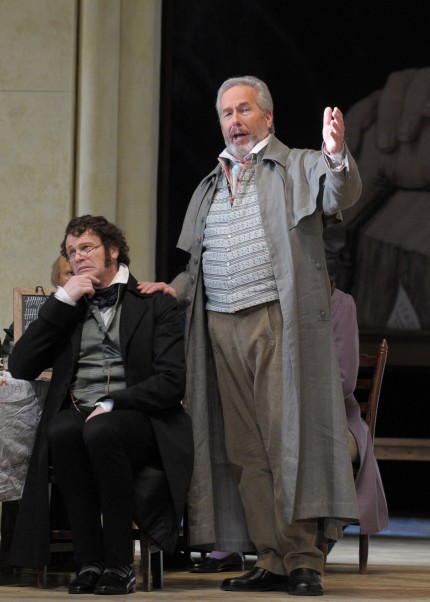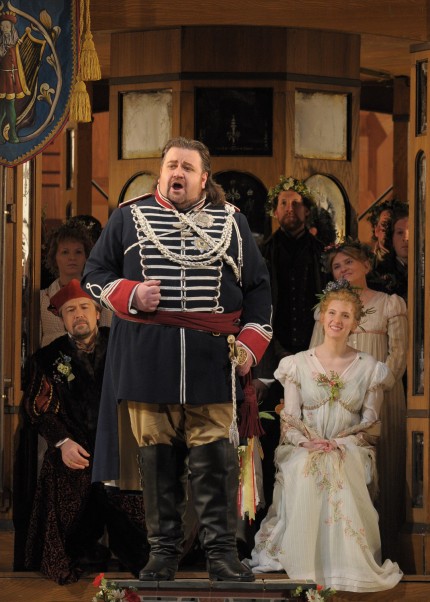Lyric Opera’s glorious “Meistersinger” takes the prize

Bo Skovhus as Beckmesser and James Morris as Hans Sachs in the Lyric Opera of Chicago’s production of “Die Meistersinger von Nürnberg.” Photo: Dan Rest.
It’s ironic and in some ways fitting that Die Meistersinger von Nürnberg, Richard Wagner’s longest mature opera, is also his lightest and most lovable.
No gods, dwarves or monsters here, nor Rheingold nor magic Tarnhelm. Wagner’s comedy, instead, is an earthbound tale of how the cobbler Hans Sachs—who also happens to be the most brilliant song expert in Nuremberg—aids the young nobleman Walther von Stolzing to win the annual Meistersinger competition, which this year offers as a prize the hand of the beautiful Eva, with whom Walther is smitten. To compete and emerge victorious, Walther most learn the rules of the competition, write his own song, and, with the aid of Sachs, outwit Beckmesser, the malevolent “Marker” or grader of contestants, who has his own designs on Eva.
While the scenario is outwardly a simple one, the story unfolds on the grandest scale, the sprawling opera a canvas for Wagner’s ideals of love, German culture and, most significantly, the hard work, seriousness of purpose and pure, open-hearted spirit necessary to create great and lasting art.
Wagner’s magnificent score is the most conversational and even Mozartian of all his operas despite its length. Meistersinger contains many of the composer’s finest inspirations including Walther’s Prize Song, the Act 3 quintet and the remarkable musical Donnybrook that ends Act 2, as the street fight morphs into a choral fugue of astounding complexity built from Beckmesser’s banal little ode.
The Lyric Opera of Chicago’s production of Meistersinger, which opened Friday night, was not faultless vocally, but got nearly all of the important things right—no mean feat in a work this vast, ambitious and complicated. The five-and-one-half-hours (including two long intervals) flew by and few people bailed before the end of the evening.
Sir David McVicar’s Glyndebourne staging gracefully nudges the action from the 16th century to the early 18th century. The traditional production offers an elegant minimalism with flowing columns forming the unit with elegant side and back sets painting the scenes for St. Catherine’s Church, the Nuremberg street and Sachs’ workshop. Only the finale’s meadow tableau seems like a misfire, with its cardboard castles and blank, brightly lit back walls looking cheap and empty. Vicki Mortimer’s period costumes were colorful and dead-on, without being gaudy, reflecting that the guildsmen are rustic artisans not nobles.
Heading up the large cast is James Morris as Hans Sachs. The cobbler-philosopher has been among Morris’s signature roles over the American bass-baritone’s illustrious career, one he has sung at the Met, in San Francisco and Berlin.
Would that Chicago could have heard his Sachs a decade ago rather than now near the end of Morris’s heralded career. There was a want of power and, often, projection Friday night with Morris’s vocal resources undeniably diminished by the passage of time. The singer was nearly inaudible at the start of his Act 2 monologue and clearly running out of steam in Sachs’ extended paean to German art at the opera’s close.
That said, Morris sang with an ease and legato that was balm to the ears in this oft-barked repertoire, yet Sachs’ outburst against the violence and perfidy of mankind had the requisite bite and intensity. While vocally this could not be called a stellar performance, Morris inhabited Sachs’ character dramatically as naturally as his work vest, bringing out the wisdom, humor and humanity of the benevolent man who puts aside his own feelings for Eva to help the younger Walther win her and the Meistersinger prize.

Johan Botha as Walther with Amanda Majeski, right, as Eva, and Dmitry Ivashchenko, left, as Pogner in Lyric Opera’s “Meistersinger.” Photo: Dan Rest.
Two years ago, Johan Botha’s rich, powerful voice was a major factor in the success of Lyric Opera’s Lohengrin, and as Walther von Stolzing, the South African tenor again delivered the vocal goods in supreme style. Granted, the rotund singer doesn’t cut a very heroic figure as the nobleman that makes Eva swoon on sight. Yet, a couple raspy low notes apart, Botha handled the role’s vocal challenges in big-voiced idiomatic style with a vibrant, towering rendition of his finished Prize Song that made it the true high point of the evening.
Tall, blonde and striking, Amanda Majeski, just two years out of the Lyric’s Ryan Opera Center certainly fits the physical bill as the fair Eva Pogner, the maiden who is the object of all the men’s attentions. While Majeski’s pure, youthful timbre is attractive and dramatically apt, her soprano sounded rather slender for this part, wanting in the kind of resplendence and cut necessary to ride Wagner’s vocal lines in the lyric climaxes.
No more withering depiction of music critics exists than Wagner’s Beckmesser, a pedantic buffoon modeled after the influential critic Eduard Hanslick, a conservative foe of the composer. (Wagner originally named the character “Hans Lich” but thought better of it, though Hanslick never forgave him for this celebrated lampooning.)
Bo Skovhus is an unlikely physical fit for Beckmesser, looking too young, tall and handsome for Eva’s hapless suitor, intended in Wagner’s libretto to be a gauche, middle-aged dork. At times his twitchy, neurotic portrayal of the comic villain crossed the line to over-the-top caricature—curiously, something McVicar says his staging strives to avoid. Yet the Danish baritone sang with dark, firmly focused tone, and Skovhus was genuinely funny in his comic moments, noisily scratching his marking chalk when his rival sings (“Nothing escapes my slate!”) and even making one feel a pang of sympathy for the defeated Beckmesser after his humiliation at the contest.
The rest of the large cast was filled out with distinction.
As Eva’s wealthy burgher father Pogner, Dimitry Ivashchenko—who could pass for Morris’s younger brother—brought apt dignity and vocal finesse even if his lightish bass lacked the sonorous weight for this part.
David Portillo made a star turn out of the ungrateful role of Sachs’ apprentice David. The Ryan Center alum displayed extraordinary artistry, singing with sweet tone and striking nuance and delicacy. The potentially deadly long passage in which David explains to Walther the guild’s song rules, instead proved a highlight of the evening, beautifully sung and expressively shaded by the Texas-born tenor. As his beloved, Jamie Barton was a worthy and characterful Magdalene.
The Meistersinger guild members (John Irvin, Daniel Sutin, Darren Jeffery, David Govertsen, Joel Sorenson, David Cangelosi, Joseph Hu, Sam Handley and Evan Boyer) were a lively, well-contrasted, and vocally distinguished bunch. What a game colleague Andrea Silvestrelli is, taking on the tiny role of the Nightwatchman and investing his brief lines with subterranean gravitas.
Taking over stage direction from McVicar at Glyndebourne, Marie Lambert kept the long evening moving efficiently yet with telling touches along the way as with Sachs’ reflective moments in his study. Nick Sandys’ direction of the massive fight scene at the climax of Act 2 was delightful and wonderfully energetic. Andrew George’s choreography, however, proved a mixed bag at best, with some of the hip-shimmying of the apprentices in Act 1 looking like a bad roadshow of Oliver.
Above all the evening belonged to Sir Andrew Davis, the Lyric Opera Orchestra and Chorus. Davis conducted with a natural yet unhurried hand, balancing deftly and bringing fine transparency to this lightest of Wagner scores. Even by their standard, the Lyric Opera Orchestra played gloriously with refined, majestic brass, personality-plus woodwinds and gleaming, burnished string playing throughout the long evening. Under Ian Robertson’s direction, the chorus sang with magnificent power, well-blended polish and sensitivity as needed.
Die Meistersinger von Nürnberg runs through March 3. lyricopera.org; 312-332-2244.